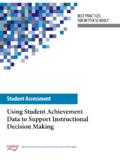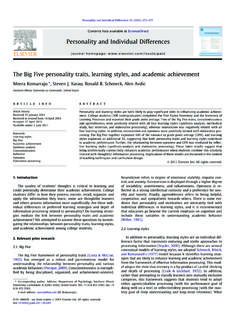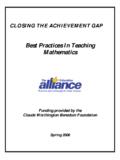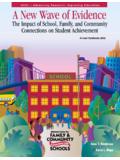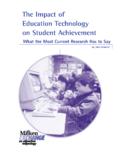Transcription of The Inßuence of Parent Education and Family …
1 The Influence of Parent Education and Family Income on ChildAchievement: The Indirect Role of Parental Expectations and theHome EnvironmentPamela E. Davis-KeanUniversity of MichiganThis study examined the process of how socioeconomic status, specifically parents educationand income, indirectly relates to children s academic achievement through parents beliefsand behaviors. Data from a national, cross-sectional study of children were used for thisstudy. The subjects were 868 8 12-year-olds, divided approximately equally across gender(436 females, 433 males). This sample was 49% non-Hispanic European American and 47%African American.
2 Using structural equation modeling techniques, the author found that thesocioeconomic factors were related indirectly to children s academic achievement throughparents beliefs and behaviors but that the process of these relations was different by racialgroup. Parents years of schooling also was found to be an important socioeconomic factorto take into consideration in both policy and research when looking at school-age literature on achievement consistently has shown thatparent Education is important in predicting children sachievement (Klebanov, Brooks-Gunn, & Duncan, 1994;Haveman & Wolfe, 1995; Smith, Brooks-Gunn, & Klebanov,1997).
3 The mechanisms for understanding this influence,however, have not been well studied. In general, familyprocess models (Linver, Brooks-Gunn, & Kohen, 2002;Yeung, Linver, & Brooks-Gunn, 2002) have examined howparenting behaviors, such as the structure of the homeenvironment, influence children s achievement have focused on specific behaviors such as harshparenting, nurturing, and warmth (Conger et al., 2002; Mis-try, Vanderwater, Houston, & McLoyd, 2002). There hasbeen less work on how factors like parental beliefs such asachievement expectations or efficacy might function aslinks between socioeconomic status (SES) and achievementoutcomes (for an exception, see Halle, Kurtz-Costes, &Mahoney, 1997).
4 The studies that do exist generally exam-ine young children in low-income or at-risk populations andfocus on income-related variables as the moderator vari-ables and Family stress as a mediator to achievement out-comes (Conger et al., 2002; Mistry et al., 2002). Thus,researchers have very little understanding of how parenteducation may influence the beliefs and behaviors of parentsof school-age children (the age at which decisions aboutcourse selection and supplemental Education such as tutor-ing might be beneficial to later college attendance).The Influence of Parent Education on Beliefsand BehaviorsEven though the majority of the literature on parents Education pertains to the direct, positive influence onachievement (Jimerson, Egeland, & Teo, 1999; Kohn, 1963;Luster, Rhoades, & Haas, 1989), the literature also suggeststhat it influences the beliefs and behaviors of the Parent ,leading to positive outcomes for children and youth (Eccles,1993).
5 For example, Alexander, Entwisle, and Bedinger(1994) found that parents of moderate to high income andeducational background held beliefs and expectations thatwere closer than those of low-income families to the actualperformance of their children, Low-income families insteadhad high expectations and performance beliefs that did notcorrelate well with their children s actual school perfor-mance. Alexander et al. suggested that the parents abilitiesto form accurate beliefs and expectations regarding theirchildren s performance are essential in structuring the homeand educational environment so that they can excel inpostschooling endeavors.
6 Halle et al. (1997), using a sampleof low-income minority families, also found that motherswith higher Education had higher expectations for theirchildren s academic achievement and that these expecta-tions were related to their children s subsequent achieve-ment in math and reading. Halle et al. found that these morepositive beliefs and expectations predicted higher amountsof achievement -related behavior by mothers in the home aswell as more positive perceptions of achievement by E. Davis-Kean, Institute for Social Research and theInstitute for Research on Women and Gender, University research was supported by Grant HD37565 from the Na-tional Institute of Child Health and Development Family and ChildWell-Being Research Network.
7 I thank Jacquelynne Eccles,Rowell Huesmann, Paul Boxer, Kai Cortina, and Eric Dubow fortheir helpful comments and assistance on early versions of thisarticle. This article was presented at the 2003 Biennial Meetingof the Society for Research on Child Development, Tampa, concerning this article should be addressed toPamela E. Davis-Kean, Institute for Social Research, University ofMichigan, 426 Thompson Street, Room 5271, Ann Arbor, Mich-igan 48106-1248. E-mail: of Family PsychologyCopyright 2005 by the American Psychological Association2005, Vol. 19, No. 2, 294 3040893-3200/05/$ DOI: on parenting also has shown that Parent educa-tion is related to a warm, social climate in the et al.
8 (1994) found that both mothers educationand Family income were important predictors of the physicalenvironment and learning experiences in the home but thatmothers Education alone was predictive of parentalwarmth. Likewise, Smith et al. (1997) found that the asso-ciation of Family income and parents Education with chil-dren s academic achievement was mediated by the homeenvironment. The mediation effect was stronger for mater-nal Education than for Family income. Thus, these authorsposited that Education might be linked to specific achieve-ment behaviors in the home ( , reading, playing). Corwynand Bradley (2002) also found that maternal Education hadthe most consistent direct influence on children s cognitiveand behavioral outcomes with some indirect influencethrough a cognitively stimulating home environment.
9 Cor-wyn and Bradley, however, examined only two, quite broadaspects of Family mediators: learning stimulation and pa-rental responsivity. Mediation might have emerged if otherparent behaviors and attitudes were Influence of RaceThe literature on race and parenting generally has focusedon how European American and African American familiesdiffer on parenting styles ( , authoritarian or authorita-tive) and how these styles influence child outcomes (Stein-berg, Dornbusch, & Brown, 1992). There has been somedebate in the literature about whether Family process modelswork the same for all races and across all SES groups(Conger et al.)
10 , 2002; Deater-Deckard & Dodge, 1997).Recent research suggests that, at least in the case of thefamily stress model, there appear to be no racial differencesbetween European Americans and African Americans (Con-ger et al., 2002; Gutman & Eccles, 1999) or African Amer-icans and Hispanics (Mistry et al., 2002). These findings arerelevant mainly to the Family stress models that look gen-erally at low-income samples for which financial stress orstrain is most likely to influence parental mental health andfunctioning. Less is known about how the effects of SESindicators are mediated by Family processes in a normativesample of families with a broad distribution on SES vari-ables.

